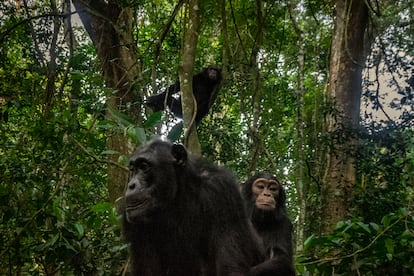The long-running debate about whether animals understand fairness
A famous study once suggested that monkeys recognize inequity, but recent research shows otherwise

The hunt begins. Red colobus monkeys swing agilely through the treetops, 130 feet (40 meters) overhead. The only way to catch them is to use strategy, coordination and cooperation. The hunters – chimpanzees of the Ivory Coast’s Tai National Park – have all three qualities. The hunters each have a role to play – one group drives the colobus monkeys toward the ambush where the other group lays in wait.
A lone chimpanzee ends up catching the colobus, but it has been a group effort. The chimpanzees distribute the meat according to how each hunter contributed to the chase. The most dominant male in the pack will receive less meat than a youngster if it played a lesser role in the hunt. But… isn’t a sense of fairness a unique attribute of human beings?
We can find fairness in every human society. A four-year-old child in any culture will protest the unequal distribution of resources. This universal human quality and its rapid development in children suggests it is an evolutionary adaptation. It has deep biological roots and is not simply a cultural inheritance. What was the context for its development in humans? The most widely accepted explanation is that we became a highly cooperative species, and the survival of such a society depends on the fair distribution of resources.
Humans are not the only animals that rely on cooperation to survive: wolves hunt in packs; ants divide the labor of digging tunnels, foraging for food and caring for the queen; and meerkats take turns watching for predators. So it’s not unreasonable to suggest that other animals have a sense of fairness. It’s a question philosophers have been pondering for centuries. Aristotle believed that this quality could not exist without language capabilities, therefore only humans have it.
Twenty years ago, scientists decided to end the philosophical debate with empirical research. In 2003, one of the most famous studies on animal behavior examined whether monkeys have a sense of fairness. Frans de Waal, a co-author of the study, described the experiment in a powerful TED talk that had audiences laughing at the similarities between human and monkey behaviors.
Two capuchin monkeys sit in adjoining cages in full view of each other. A person stands in front of the cages with two bowls – one with cucumbers and the other grapes (the monkey’s favorite fruit). The capuchins have been trained to pick up a stone in the cage and hand it to the person who rewards them with food from one of the bowls.
The first monkey hands over the stone and is given a piece of cucumber to eat. The other monkey is rewarded with a grape for the same task. When the first monkey is again given a cucumber instead of a grape, it angrily throws it back, clearly dissatisfied with the food distribution. The researchers interpreted this behavior as evidence that the monkeys reacted negatively to inequity.
More research followed to replicate the experiment with other species. Several studies were published suggesting that rats, crows, cockatoos, dogs and other primates are also sensitive to inequity and, therefore, have a sense of fairness. Yet, other studies used the same methodology and did not obtain the same results. This is common in laboratory studies of animal behavior, as samples are often small. For example, only five females showed aversion behavior in the capuchin monkey study, which proves the need for more research before publishing headline-grabbing news.
Interpreting the behavior of the animals that reject the worst quality item also causes controversy. We intuitively think the rejection is because of an innate sense of fairness, but does the animal’s frustration really come from comparing rewards? Or could there be another explanation?
Two opposing hypotheses attempt to answer this question. The hypothesis of adverse behavior as a response to inequity argues that social comparison exists. In other words, without another monkey for comparison, no unwanted cucumbers would be thrown.
The social deception hypothesis questions whether animals have a sense of fairness. It suggests that animals do not respond to inequity, but are simply disappointed because they can see but not get their favorite food. The frustration does not arise from a social comparison, but a comparison between how they are treated versus how they could be treated. Some evidence now exists that this hypothesis may be on the right track. A recent study on macaques by the German Primatology Center conducted a similar study to the capuchin monkey experiment, but used machines instead of humans to dispense the food.
The macaques almost never rejected food given by the machine, whereas they rejected it over 20% of the time when given by a human. The study’s authors say these results support the social deception hypothesis. Monkeys have no social expectations of a machine and therefore cannot be disappointed. Paradoxically, they had a positive relationship with the human conducting the experiment.
This study does not definitively prove that animals lack a sense of fairness, because the conclusions drawn from laboratory studies are always limited, while animals in the wild show the most authentic behavior. However, it sheds more light on this debate, leads us to reinterpret the famous 2003 experiment, and takes the shine off popular and long-standing theories about the sense of fairness in monkeys.
Sign up for our weekly newsletter to get more English-language news coverage from EL PAÍS USA Edition
Tu suscripción se está usando en otro dispositivo
¿Quieres añadir otro usuario a tu suscripción?
Si continúas leyendo en este dispositivo, no se podrá leer en el otro.
FlechaTu suscripción se está usando en otro dispositivo y solo puedes acceder a EL PAÍS desde un dispositivo a la vez.
Si quieres compartir tu cuenta, cambia tu suscripción a la modalidad Premium, así podrás añadir otro usuario. Cada uno accederá con su propia cuenta de email, lo que os permitirá personalizar vuestra experiencia en EL PAÍS.
¿Tienes una suscripción de empresa? Accede aquí para contratar más cuentas.
En el caso de no saber quién está usando tu cuenta, te recomendamos cambiar tu contraseña aquí.
Si decides continuar compartiendo tu cuenta, este mensaje se mostrará en tu dispositivo y en el de la otra persona que está usando tu cuenta de forma indefinida, afectando a tu experiencia de lectura. Puedes consultar aquí los términos y condiciones de la suscripción digital.









































